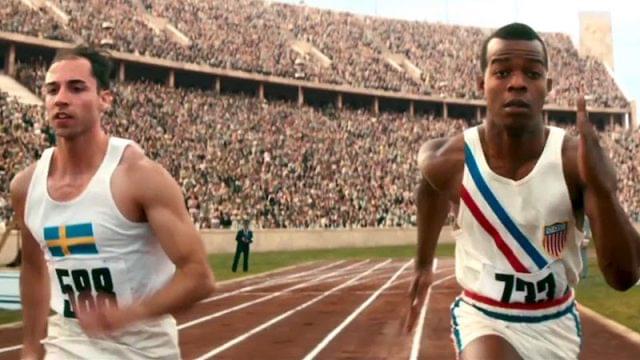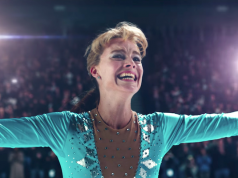
When you have a story that’s about track and field as well as racial prejudice, the temptation to call it “Race” is too great to resist, and we should not fault the makers of “Race” for it. They are not made of stone. In fact, that title turns out to be a perfect fit for the movie: earnest, straightforward, and a little on-the-nose.
Eighty years later, Jesse Owens is still a household name for his dramatic, Hitler-defying wins at the 1936 Olympics. Yet apart from a 1984 TV miniseries, his story hasn’t really been told cinematically. “Race,” directed by Stephen Hopkins (“The Life and Death of Peter Sellers,” “Predator 2”) and starring Stephan James (who played civil rights activist John Lewis in “Selma”), fills that need well enough, giving a respectful account of Owens’ record-breaking success and his struggles against racism at home and abroad. If nothing else, it’s a great calling card for James, an appealing Canadian actor on the verge of stardom.
We begin with young, eager-to-please Jesse becoming the first member of his family to go to college (well, Ohio State), where he joins the track team. Under the direction of coach Larry Snyder (Jason Sudeikis), a washed-up runner who spends most nights in a whiskey bottle, Jesse immediately establishes himself as a force to be reckoned with, breaking three world records in a single meet and becoming a star. He and his black teammates still aren’t allowed to shower with the white athletes (we’ll blame that on insecurity), but the newspapers are talking about him, and Snyder has his eye on the upcoming Olympics in Berlin.
Speaking of which, the American Olympic Association isn’t sure the U.S. is going. In a series of New York meetings that look like country club events, the AOA members debate whether Germany’s anti-Jew and anti-Negro sentiments are cause for boycott. AOA president Avery Brundage (Jeremy Irons), a rich industrialist, believes politics shouldn’t play a part in the Olympics, and after personally warning Joseph Goebbels (Barnaby Metschurat) to take it down a notch and not to discriminate against the U.S. team’s Jewish and black athletes, the matter is settled. There remains, however, the question of whether individual players want to take part.
The film, written by Joe Shrapnel (!) and Anna Waterhouse, can barely scratch the surface of all the situation’s complexities. In addition to Jesse’s internal struggle over whether he’d send a better message by competing or boycotting, there’s the uncomfortable fact that the German racism and anti-semitism now inspiring indignation aren’t exactly unknown in America. (“When’s the last time any of you played 18 holes of golf with a Jew?” asks Brundage during an AOA meeting. “Or a Negro, for that matter?”) And in Germany, a talented filmmaker named Leni Riefenstahl (Carice van Houten) has been recruited by Goebbels to document what happens at the Olympics and to show the superiority of the Aryan race … even if those two things prove contradictory.
The various moral dilemmas at play here could fill a hundred movies. “Race” can focus on only a few, and even those must be simplified for easy digestion. If we’re ever unsure how we’re supposed to feel, there’s usually a line of dialogue to explain it, as when an announcer at the Games tells us, “This is the true spirit of sportsmanship we’re seeing between these two athletes today” (in case we didn’t realize that’s what we were looking at).
But the movie gains points in the relationship between Jesse and Coach Snyder. While it has a touch of the familiar “wise, paternal mentor guides protege” feel, it’s more like a friendship between a kid and an older brother: affectionate, respectful, and teasing. “SNL” alum Jason Sudeikis may not have great dramatic chops, but his comedy background gives him an easy rapport with James, who has charisma to spare. As inspiring sports dramas go, it’s pretty standard. But while Owens deserves better than that (and maybe something that examines his whole life, not just one year of it), this is a good start.
B- (2 hrs., 14 min.; )





